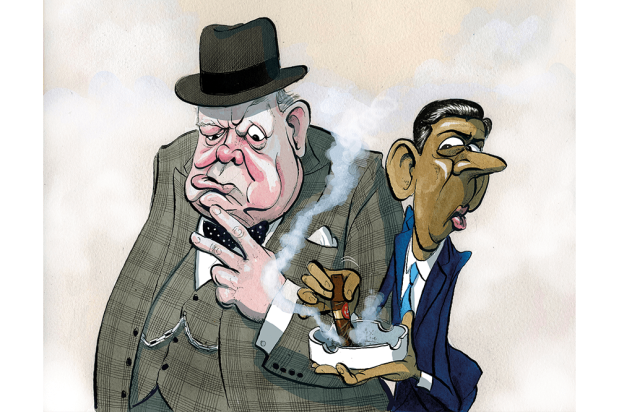The Nato summit in Vilnius has been an eventful one already. Even though no clear timeline for when the country can join the group was given, Ukraine’s hopes of one day becoming a Nato member were given a boost. Secretary General Jens Stoltenberg has hailed proposals as ‘a strong package for Ukraine, and a clear path towards its membership in Nato.’
And there are other parts of the final communique which carry more relevance closer to home — in particular, the alliance’s renewed and notably strong language opposing the Treaty on the Prohibition of Nuclear Weapons (TPNW). Yet the SNP government led by Humza Yousaf remains committed to an independent Scotland achieving Nato accession — while also formally ratifying the TPNW.
The TPNW is a UN treaty that came into force in 2021 and is effectively a commitment to unilateral — as opposed to multilateral — nuclear disarmament. Also known as the ‘ban treaty’, it requires its signatories ‘not to develop, test, produce, acquire, possess, stockpile, use or threaten to use nuclear weapons’. It prohibits the stationing or deployment of another country’s nuclear weapons on a state signatory’s national territory. But after Russia’s invasion of Ukraine (a state that voluntarily became a non-nuclear weapons state in the 1990s), the TPNW looks increasingly naive.
No Nato members have ratified the TPNW. In fact, in October last year, Sweden (which now looks set to join the Alliance alongside its newly acceded neighbour Finland) for the first time voted against an annual UN General Assembly resolution that welcomes the adoption of the TPNW and calls for all states to sign, ratify or accede to it at the earliest possible date. In 2022, Finland also voted against the resolution for the first time, having applied for Nato membership.
And what had Nato’s Vilnius communique to say on the ban treaty?
We reiterate that the Treaty on the Prohibition of Nuclear Weapons (TPNW) stands in opposition to and is inconsistent and incompatible with the Alliance’s nuclear deterrence policy, is at odds with the existing non-proliferation and disarmament architecture, risks undermining the Non-Proliferation of Nuclear Weapons (NPT), and does not take into account the current security environment. The TPNW does not change the legal obligations on our countries with respect to nuclear weapons. We do not accept any argument that the TPNW reflects or in any way contributes to the development of customary international law. We call on our partners and all other countries to reflect realistically on the ban treaty’s impact on international peace and security, including on the NPT, and join us in working to improve collective security through tangible and verifiable measures that can reduce strategic risks and enable lasting progress on nuclear disarmament.
It is clearer than ever that Nato stands firmly against the TPNW. The SNP’s position should be equally unequivocal. If the Scottish government is in favour of Nato membership then it must oppose the ban treaty, and it should certainly not be pushing the false narrative that an independent Scotland can both accede to Nato membership and sign up to the treaty.
In 2021, former first minister Nicola Sturgeon said that an independent Scotland would be ‘a keen signatory’ to the TPNW while noting her government ‘thanks and congratulates all the states which have ratified the treaty’. Since then, the SNP has said nothing on the specifics of its stance on the ban treaty — neither refuting its 2021 position to reflect the development of the Russian war on Ukraine, nor publicly reaffirming its pro-TPNW view. The nationalist party does, however, regularly promote its opposition to nuclear weapons in general, which the party’s leadership likely views as a low-hanging-fruit method of keeping Scotland’s radical left on side.
The SNP’s inability to be open about its stance on the ban treaty is as expected as it is telling — and it is not good enough.
Dig deeper, however, and it seems the SNP’s traditional hard-line commitment to unilateral nuclear disarmament might be cracking. The wording on nuclear disarmament in the Scottish government’s latest white paper on a seceded Scotland’s constitution appears to be carefully chosen to leave the door open to at least assisting in the deployment of nuclear weapons by ally states. It says nothing about ratifying TPNW and merely suggests that the new state’s written constitution should contain a prohibition on nuclear weapons being ‘based in Scotland’.
As in other areas, such as on EU accession, it is likely the SNP aims to use language that will appeal to all sides while not dealing directly with the reality of what joining the Nato club actually means. This inability to be open about its stance on the TPNW is as expected as it is telling — and it is not good enough. If the party’s ambition really is for an independent Scotland to become a member of Nato then it must disavow the ban treaty and publicly reverse the position previously outline by Sturgeon.
The SNP might also wish to consider toning down its virtue signalling on nuclear weapons more broadly. Those Scots who are members of groups like Campaign for Nuclear Disarmament (CND), who may well back the SNP because they believe the party is committed to the TPNW, are being taken for mugs. They surely deserve some honesty.
Nato’s newest member, Finland, is now taking part in Nato’s nuclear planning. Its position is obviously incompatible with signing up to the TPNW. It will never become a signatory to the treaty — and neither would an independent Scotland that is part of Nato. This is simply the truth of it
Got something to add? Join the discussion and comment below.
Get 10 issues for just $10
Subscribe to The Spectator Australia today for the next 10 magazine issues, plus full online access, for just $10.




















Comments
Don't miss out
Join the conversation with other Spectator Australia readers. Subscribe to leave a comment.
SUBSCRIBEAlready a subscriber? Log in